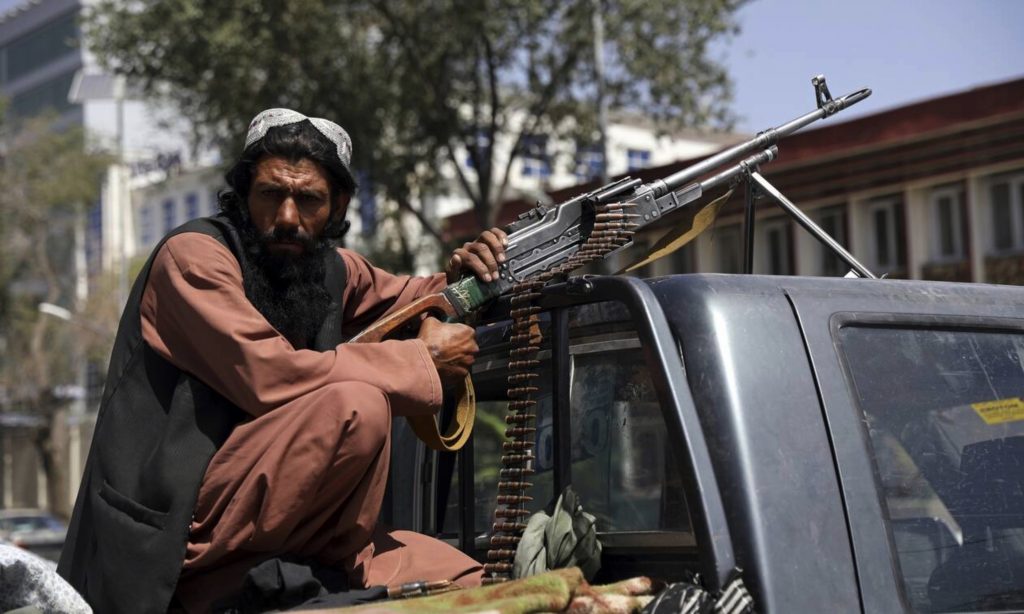
Written by Karim Merchant & Ingrid Nyborg.
20 years after Western troops invaded Afghanistan in the aftermath of the September 11 attacks, Kabul has fallen. The speed of the Taliban’s sweep through Afghanistan following the withdrawal of U.S. troops has startled many officials. Many see the US announcement of a troop withdrawal in April, followed by that of NATO troops, as a catalyst for the Taliban expansion campaign. Even the militants themselves are surprised by the speed, according to a recent video statement by the head of the Taliban’s political bureau.
International diplomats and officials were apparently caught unawares, with hastily arranged evacuations in military helicopters. Afghans are also scrambling to board outbound flights in a panicked race to leave Kabul, fuelled by the fear of an uncertain future steeped in increasing restrictions and violence.
Suddenly, Afghans again face the prospect of complete domination by the Taliban. But this time, they say, it is different.
Differences between the Taliban take-over in 1996 and 2021
A different Taliban: Although the ideology and military approach remains identical, the Taliban has enjoyed significant international exposure over the past several years in particular, and it intends to continue engaging with the international community. Both China and Russia have already offered to work with the Taliban government and others will follow, albeit on more cautionary terms.
There are rumours that a possible ceasefire may be offered in return for aid and development assistance. In addition, the UN have had an easier time negotiating with the Taliban to continue elements of their operations on the ground. Unlike previously, banks, shops and universities have been encouraged to re-open. At the time of writing, public announcements have been made encouraging women to return to work, be it in the media, education, health or any other sphere. The stance on the treatment of women and human rights issues, however, seems to be deliberately vague. There are references to “frameworks and guidelines” but no clarity on what those actually are.
Lack of concerted opposition: U.S. and NATO troop withdrawals created strategic gaps in the over-burdened Afghan National Defence and Security Forces. Limited air support and intelligence-sharing left Afghan troops exposed and vulnerable. Ultimately, a national leadership divided by self-interest destroyed the morale of the Afghan National Defence and Security Forces.
For well-established Afghan powerbrokers (such as Mujahidin leaders who became warlords, members of the political elite and large-scale landowners), the battlefield has been replaced by the negotiating table. The assets that these powerbrokers have accumulated since 2001 were a key determinant in how they chose to engage with an ascendant Taliban. This has resulted in less infrastructure destruction and bloodshed than their previous entry into Kabul.
What is not yet clear is the role the warlords will play in a new Taliban government. Can they retain the loyalty of their supporters if they have been allowed to retain some or all of their traditional areas of influence and control? Some of these supporters turned to the Taliban after feeling abandoned by their leaders, who were reluctant to go to combat in the way that they had done in the past. This reluctance was viewed by many as a sign of weakness.
A progressive Afghanistan? The country has experienced a social transformation over the last two decades. A good percentage of its population have never experienced a Taliban regime. The country has unprecedented access to knowledge and the outside world. Afghanistan has enjoyed cultural, economic and social gains, including increased rights for women and more freedom of speech. The Afghan population will not surrender these gains easily. It appears that elements of this are negotiable with the Taliban, who seem to desire a more amenable form of governance this time round. A young and proactive population accustomed to articulating open criticism, and the use of social media to monitor and report abuses and injustices, is also something the Taliban will have to accept and learn to deal with. The Taliban must now operate in the knowledge their every move will be under the watchful eye of millions, both domestically and internationally.
Moving forward under a new Taliban government
The Taliban appear to be moving towards the formation of a full-blown government. They have no desire to set up an interim administration, as had been suggested and discussed over several meetings of the Doha Peace Process in late 2020 and early 2021. They are currently in dialogue with senior Afghan political figures to reach an agreement and provide nominal confidence-building measures that aim to balance aspects that are palatable to the international community, whilst remaining within Sharia guidelines.
The main concern here is that, given the fact that the Taliban is not one coherent group, how long it will be before internal rivalries and differing interpretations of governance create fragmentation, and independent actions from Kabul. How safe will minorities be under Taliban rule? Will there be a very different set of rules for urban and rural areas?
Whatever shape the new government takes, there will be a technocratic element charged with implementing the daily running of the country. There will be ministries with civil servants – but what role will national and international Non-Governmental Organisations (NGOs) have? So far, Taliban authorities are requesting details of staff and activities. There are not, at the time of writing, any reported attempts to block ongoing work on the ground. Having spoken to several heads of NGOs and community organisations (unregistered self-assistance groups established by communities themselves), they all seem cautious in their initial dealings with the Taliban, but have been informed to carry on as normal, including the use of female staff. This is not so surprising for NGOs that have been working in Taliban-controlled areas for years – there is already a model in place for establishing working relationships with a Taliban governance structure, and retaining the ability to deliver humanitarian and complex development objectives.
With the situation in Afghanistan being closely scrutinized over the next few months, much depends on how the Taliban conduct themselves. Can they ensure that electricity and water supplies will be maintained? Can the general population begin to move out of the shadow of fear of repression? Will the Taliban be able to build some element of trust with the international community and gain the legitimacy it desires? Will the international community be willing to engage in meaningful dialogue with the emerging Taliban government? More broadly, will the swift Taliban victory in Afghanistan inspire other extremist and insurgent movements into a resurgence elsewhere?
Noragric has been working with local and international organisations in Afghanistan for more than 20 years. This work has focused on human security, development and livelihood issues. At this crucial point, we can only stress the urgency and importance of maintaining a critical eye, not only on recent events, but on the longer-term processes which contributed to today’s crisis of governance.
 Karim Merchant teaches on the course ‘Statebuilding, Security and Development in Fragile and Conflict Affected States: A Case Study of Afghanistan‘ on NMBU’s Master’s programme in International Relations. He is a consultant on policy, programme and project development and management in the fields of humanitarian assistance, food security, conflict-sensitive development and peace-building.
Karim Merchant teaches on the course ‘Statebuilding, Security and Development in Fragile and Conflict Affected States: A Case Study of Afghanistan‘ on NMBU’s Master’s programme in International Relations. He is a consultant on policy, programme and project development and management in the fields of humanitarian assistance, food security, conflict-sensitive development and peace-building.
 Ingrid Nyborg is an Associate Professor at Noragric. She specializes in post-conflict and post-crisis development in South Asia, with a focus on Pakistan and Afghanistan. Since 2005, Nyborg has studied rural livelihoods in Afghanistan, focusing on participatory methods and co-production of knowledge with local development organizations as an example of capacity-building research.
Ingrid Nyborg is an Associate Professor at Noragric. She specializes in post-conflict and post-crisis development in South Asia, with a focus on Pakistan and Afghanistan. Since 2005, Nyborg has studied rural livelihoods in Afghanistan, focusing on participatory methods and co-production of knowledge with local development organizations as an example of capacity-building research.



Permalink
Very interesting initial assessment. As I remember the Taliban take over in 1996… began somewhat similar with the Taliban stating a need to return to peace and rule of law under an Islamic republic…that was what was said at first